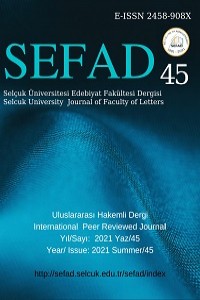Abstract
Amerikalı yazar Ursula K. Le Guin’in 1974’te yazdığı Mülksüzler romanı, ana karakter Shevek’in Anarres ve Urras isimli iki gezegenin ilişkilerini, bu ideolojik düşmanları ayıran sembolik duvarları yıkarak geliştirmek için çıktığı görevi konu alır. Roman, bu anlamda, ütopik/anti-ütopik bir devlet tasvirinden çok, tek bir adamın ideal bir devlet arayışı olarak okunabilir. Eleştirmen ve akademisyenler, Mülksüzler romanını çoğunlukla anarşist, ekolojik ve devrimci siyaset açısından çeşitli yönleriyle ele almıştır. Ancak bu makale, kahramanın psikolojisine ve bunun romandaki sosyo-sembolik düzenlerle ilişkisine değinerek romana Lacancı bir bakış açısıyla yaklaşmayı amaçlamaktadır. Bu makale, Mülksüzler romanında özne ile öteki arasındaki ilişkileri anarşist (ve aynı zamanda kapitalist) bir kültürde nasıl nitelendirebileceğimize odaklanarak, romanın ideal bir topluma doğru nasıl bir yol sağladığını incelemeyi amaçlamaktadır.
References
- Bianchi, P. (2012). From representation to class struggle. S: Journal of the Van Eyck Circle for Lacanian Ideology Critique, 5, 114-126.
- Evans, D. (2006). An introductory dictionary of lacanian psychoanalysis. London and New York: Routledge.
- Fink, B. (1995). The lacanian subject: Between language and jouissance. New Jersey: Princeton University Press.
- Freedman, C. (2000). Critical theory and science fiction. Middletown: Wesleyan University Press.
- Khouri, N. (1980). The dialectics of power: Utopia in the science fiction of Le Guin, Jeury, and Piercy. Science Fiction Studies, 7(1), 49-60. Retrieved from www.jstor.org/stable/4239310
- Lacan, J. (1999). To Jakobson. In J. Lacan, The seminar of Jacques Lacan, book xx, on feminine sexuality: The limits of love and knowledge. (B. Fink, Trans.) (pp. 14-25). New York: W. W. Norton. (Original work published 1975)
- Lacan, J. (2007). The seminar of Jacques Lacan, book xvii, the other side of psychoanalysis. (R. Grigg, Trans.) New York: W. W. Norton. (Original work published 1991)
- Le Guin, U. K. (1975). The dispossessed: An ambiguous utopia. New York: Avon.
- Somay, B. (2005). From ambiguity to self-reflexivity: Revolutionizing fantasy space. In L. Davis, & P. G. Stillman (Eds.), The new utopian politics of Ursula K. Le Guin's the dispossessed (pp. 233-247). Lanham: Lexington.
- Stillman, P. G. (2005). The dispossessed as ecological political theory. In L. Davis, & P. G. Stillman (Eds.), The new utopian politics of Ursula K. Le Guin's the dispossessed (pp. 55-73). Lanham: Lexington.
- Žižek, S. (1994). The metastases of enjoyment: Six essays on woman and causality. New York: Verso.
- Žižek, S. (2007). How to read Lacan. New York: W. W. Norton.
Abstract
Written in 1974, the American writer Ursula K. Le Guin’s The Dispossessed revolves around the central character Shevek’s self-appointed mission to improve the relationship between two planets, Anarres and Urras, by breaking down the walls that are separating these ideological enemies. The novel, in that sense, can be read as one man’s search for an ideal state, rather than a description of a utopian/anti-utopian state. Literary scholars generally focus on various aspects of The Dispossessed in terms of its anarchist politics, ecological politics, and revolutionary politics. This article; however, aims to approach the novel from a Lacanian perspective by addressing the protagonist’s psyche and his relation to the socio-symbolic orders in the novel. By focusing on the characterization of the relations between the subject and the other in an anarchist (as well as a capitalist culture) in The Dispossessed, this article aims to analyze how the novel provides a path towards an ideal state.
References
- Bianchi, P. (2012). From representation to class struggle. S: Journal of the Van Eyck Circle for Lacanian Ideology Critique, 5, 114-126.
- Evans, D. (2006). An introductory dictionary of lacanian psychoanalysis. London and New York: Routledge.
- Fink, B. (1995). The lacanian subject: Between language and jouissance. New Jersey: Princeton University Press.
- Freedman, C. (2000). Critical theory and science fiction. Middletown: Wesleyan University Press.
- Khouri, N. (1980). The dialectics of power: Utopia in the science fiction of Le Guin, Jeury, and Piercy. Science Fiction Studies, 7(1), 49-60. Retrieved from www.jstor.org/stable/4239310
- Lacan, J. (1999). To Jakobson. In J. Lacan, The seminar of Jacques Lacan, book xx, on feminine sexuality: The limits of love and knowledge. (B. Fink, Trans.) (pp. 14-25). New York: W. W. Norton. (Original work published 1975)
- Lacan, J. (2007). The seminar of Jacques Lacan, book xvii, the other side of psychoanalysis. (R. Grigg, Trans.) New York: W. W. Norton. (Original work published 1991)
- Le Guin, U. K. (1975). The dispossessed: An ambiguous utopia. New York: Avon.
- Somay, B. (2005). From ambiguity to self-reflexivity: Revolutionizing fantasy space. In L. Davis, & P. G. Stillman (Eds.), The new utopian politics of Ursula K. Le Guin's the dispossessed (pp. 233-247). Lanham: Lexington.
- Stillman, P. G. (2005). The dispossessed as ecological political theory. In L. Davis, & P. G. Stillman (Eds.), The new utopian politics of Ursula K. Le Guin's the dispossessed (pp. 55-73). Lanham: Lexington.
- Žižek, S. (1994). The metastases of enjoyment: Six essays on woman and causality. New York: Verso.
- Žižek, S. (2007). How to read Lacan. New York: W. W. Norton.
Details
| Primary Language | English |
|---|---|
| Subjects | Creative Arts and Writing |
| Journal Section | Articles |
| Authors | |
| Publication Date | June 7, 2021 |
| Submission Date | August 26, 2020 |
| Published in Issue | Year 2021 Issue: 45 |
Selcuk University Journal of Faculty of Letters will start accepting articles for 2025 issues on Dergipark as of September 15, 2024.


